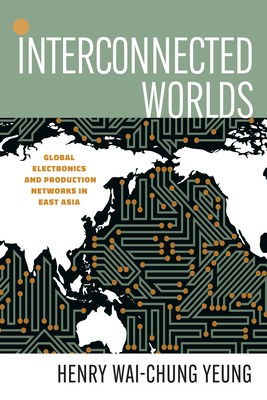
- We will send in 10–14 business days.
- Author: Henry Wai-Chung Yeung
- Publisher: STANFORD BUSINESS BOOKS
- ISBN-10: 1503615294
- ISBN-13: 9781503615298
- Format: 16.4 x 23.4 x 3.4 cm, kieti viršeliai
- Language: English
- SAVE -10% with code: EXTRA
Reviews
Description
The global electronics industry is one of the most innovation-driven and technology-intensive sectors in the contemporary world economy. From semiconductors to end products, complex transnational production and value-generating activities have integrated diverse macro-regions and national economies worldwide into the "interconnected worlds" of global electronics. This book argues that the current era of interconnected worlds started in the early 1990s when electronics production moved from systems dominated by lead firms in the United States, Western Europe, and Japan towards increasingly globalized and cross-macro-regional electronics manufacturing centered in East Asia. By the 2010s, this co-evolution of production network complexity transformed global electronics, through which lead firms from South Korea, Taiwan, and China integrated East Asia into the interconnected worlds of electronics production across the globe.
Drawing on literature on the electronics industry, new empirical material comprising custom datasets, and extensive personal interviews, this book examines through a "network" approach the co-evolution of globalized electronics production centered in East Asia across different national economies and sub-national regions. With comprehensive analysis up to 2021, Yeung analyzes the geographical configurations ("where"), organizational strategies ("how"), and causal drivers ("why") of global production networks, setting a definitive benchmark into the dynamic transformations in global electronics and other globalized industries. The book will serve as a crucial resource for academic and policy research, offering a conceptual, empirically driven grounding in the theory of these networks that has become highly influential across the social sciences.
EXTRA 10 % discount with code: EXTRA
The promotion ends in 22d.18:00:34
The discount code is valid when purchasing from 10 €. Discounts do not stack.
- Author: Henry Wai-Chung Yeung
- Publisher: STANFORD BUSINESS BOOKS
- ISBN-10: 1503615294
- ISBN-13: 9781503615298
- Format: 16.4 x 23.4 x 3.4 cm, kieti viršeliai
- Language: English English
The global electronics industry is one of the most innovation-driven and technology-intensive sectors in the contemporary world economy. From semiconductors to end products, complex transnational production and value-generating activities have integrated diverse macro-regions and national economies worldwide into the "interconnected worlds" of global electronics. This book argues that the current era of interconnected worlds started in the early 1990s when electronics production moved from systems dominated by lead firms in the United States, Western Europe, and Japan towards increasingly globalized and cross-macro-regional electronics manufacturing centered in East Asia. By the 2010s, this co-evolution of production network complexity transformed global electronics, through which lead firms from South Korea, Taiwan, and China integrated East Asia into the interconnected worlds of electronics production across the globe.
Drawing on literature on the electronics industry, new empirical material comprising custom datasets, and extensive personal interviews, this book examines through a "network" approach the co-evolution of globalized electronics production centered in East Asia across different national economies and sub-national regions. With comprehensive analysis up to 2021, Yeung analyzes the geographical configurations ("where"), organizational strategies ("how"), and causal drivers ("why") of global production networks, setting a definitive benchmark into the dynamic transformations in global electronics and other globalized industries. The book will serve as a crucial resource for academic and policy research, offering a conceptual, empirically driven grounding in the theory of these networks that has become highly influential across the social sciences.


Reviews